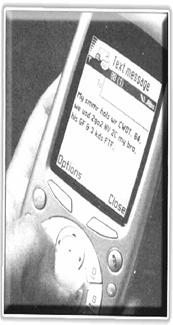
Can you understand the beginning of this essay(短文)?
“My smmr hols wr CWOT. B4, we usd 2go2 NY 2C my bro, his GF & 3 kds FTF.”
The Scottish teacher who received it in class had no idea what the girl who wrote it meant. The essay was written in a form of English used in cell phone text messages(短信). Text messages (also called SMS) through cell phones became very popular in the late 1990s. At first, mobile phone companies thought that text messaging would be a good way to send messages to customers, but customers quickly began to use the text messaging service to send messages to each other. Teenagers in particular enjoyed using text messaging, and they began to create a new language for messages called “texting.”
A text message is limited to 160 characters, including letters, spaces, and numbers, so messages must be kept short. In addition, typing on the small keypad of a cell phone is difficult, so it's common to make words shorter. In texting, a single letter or number can represent(代表) a word, like “r” for “are,” “u” for “you,” and “2” for “to.” Several letters can also represent a phrase, like “l(fā)ol” for “l(fā)aughing out loud.” Another characteristic(特征) of texting is the leaving out of letters in a word, like spelling “please” as “pls.”
Some parents and teachers worry that texting will make children bad spellers and bad writers. The student who wrote the essay at the top of this page said writing that way was more comfortable for her. (The essay said, “My summer holidays were a complete waste of time. Before, we used to go to New York to see my brother, his girlfriend, and their three kids face to face.”)
Not everyone agrees that texting is a bad thing. Some experts say languages always develop, and this is just another way in which English is changing. Other people believe texting will disappear soon. New technology for voice messages may soon make text messages a thing of the past.
1. What is the writer's opinion of text messaging?
A. The writer does not give his opinions.
B. It is not bad for children.
C. It will make children bad writers.
D. It is fun and easy to do.
2. Which characteristic of texting is NOT described in the passage?
A. Using letters to represent words.
B. Using phrases to represent essays.
C. Using letters to represent phrases.
D. Using numbers to represent words.
3. Which of the following was most probably the title of the student's essay?
A. My Smmr Hols B. CU in LA C. My GF D. My Gr8 Tchr
4. Why do some people think that texting is bad?
A. It costs too much. B. It's too difficult to type.
C. Teenagers won't learn to write correctly. D. It's not comfortable.
5. Why aren't some people worried about the effect of texting?
A. Not many people use texting.
B. Spelling in English is too difficult.
C. Teenagers quickly become bored with texting.
D. Texting will disappear because of new technology.

 ked myself, “Why don't they just leave it alone?”
ked myself, “Why don't they just leave it alone?”  , and pretty soon the trees started dying, too. Next, the park swimming pool was closed. The city cut down on the work force that kept the park, and pretty soon it just got too ugly and dirty to enjoy anymore.
, and pretty soon the trees started dying, too. Next, the park swimming pool was closed. The city cut down on the work force that kept the park, and pretty soon it just got too ugly and dirty to enjoy anymore. B. people would have to desert their homes
B. people would have to desert their homes